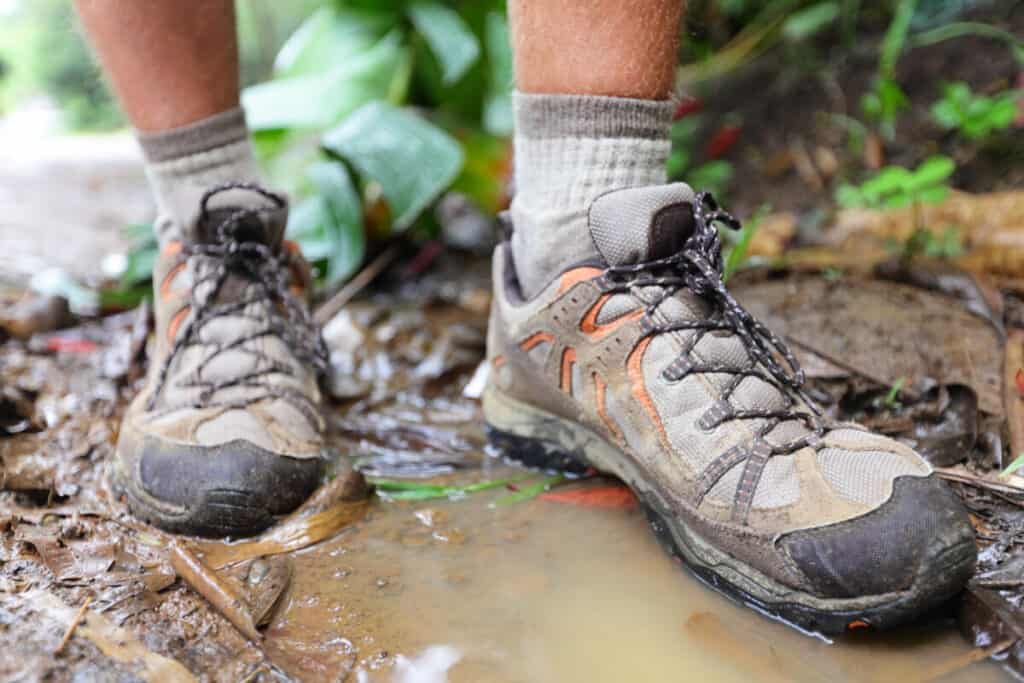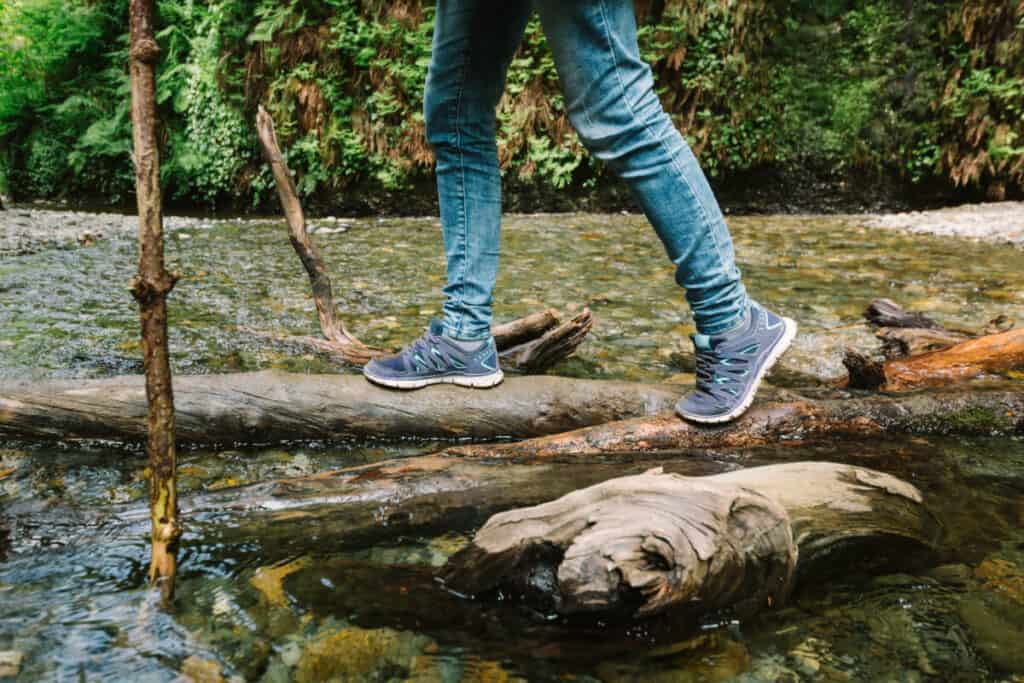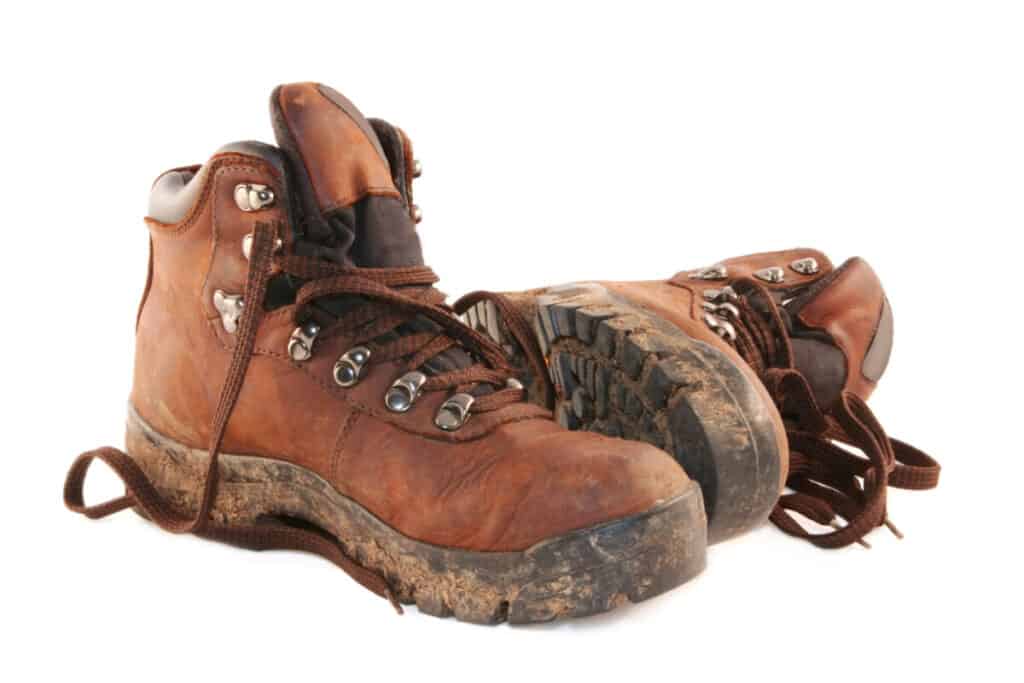Whether you’re just getting into hiking or have been exploring trails for years, you’ve seen advertisements and testimonies for the benefits of hiking shoes. But, the cost of official hiking shoes may make you say, “eek” since it’s around $100 for a new pair. So, do you really need hiking shoes?

Hiking shoes are not strictly necessary to go hiking. If you’re going for a mild or short hike, you can get away with wearing normal running shoes, trail shoes, or any other active shoe. Even if you’re going for a longer hike (5 to 10 miles) you can still get away with regular active shoes. However, certain terrain and distances make hiking shoes much more important.
There are some benefits to wearing hiking shoes and there are times when you want to choose hiking shoes over your regular day shoes. Especially if you are considering getting into backpacking and more intense hiking, investing in a pair of hiking shoes may be a good idea.
By the way, as an Amazon Associate, I earn when buying qualified products through links on my site.
To find out when you need hiking shoes and why they are important, read on.
When Do I Need Hiking Shoes And When Can I Skip Them?
The kind of shoes you need for hiking really depends on the hike you’re planning. If your hike is going to be short (less than 3 miles) and on a paved path, you can get away with wearing your everyday shoes or sandals. If you do choose sandals, however, stay away from anything with a large heel because your feet will definitely get sore and you might trip.
If your hike is going to be longer (between 3 and 6 miles), you want to wear shoes meant for activity. More often than not, these shoes will be lightweight, breathable, and provide more support than shoes that aren’t designed for movement. This could one of the following:
- Running Shoes
- Trail Running Shoes
- Tennis Shoes
- Hiking Shoes
- Sneakers
When you’re choosing which shoes to wear on your hike, you might want to consider the condition of the trails. Many people invest in hiking shoes (or at least designate a pair of older running shoes) to hiking so that they can protect their everyday shoes from the wear and tear of trekking the trails. Plus, if you want to avoid getting your shoes muddy, a pair of hiking shoes may be the way to go.
In short, if you’re going to be on rough terrain, no matter the distance, then you may want to get hiking shoes. I have hiked in running shoes many times over the years, but now I own a pair of Keen’s Voyageur (REI here, or here on Keen’s website) hiking shoes and they make a tremendous difference. The amount of foot protection you get in hiking shoes is huge in comparison to regular running shoes. If I’m going up a mountainside with switchbacks and rocky trails, I’m wearing my hiking shoes.
What Kind Of Shoes Do You Need For Hiking?
The shoes that you often use for hiking are hiking shoes, hiking boots, and trail running shoes. For an easy way to see the differences and when you’d likely wear them, we put together a table for comparison.
| Shoe | Physical Characteristics | When Should You Wear Them? |
| Trail Running Shoes | Lightweight, comfortable, and good support | Will provide some of the best performance and will be lightweight for easier hikes or trail runs. Can be used in casual hiking or even in mid-distances if you have strong ankles. Some (more extreme) hikers only wear trail runners. |
| Hiking Shoes | Comfortable, durable, good protection, better support | Great for all hikes and every kind of terrain. Hiking shoes can be used for both casual and long hikes on established trails. Not adept for muddy terrain, but hiking shoes can take a beating. |
| Hiking Boots | Heavy, good protection, most support, and durable | Good for lasting a long time and hiking in rough and wet/snowy terrain. Better for the hiker who hikes up the sides of mountains and needs better ankle support and grip. |
Even though you don’t necessarily need hiking shoes, you do need a shoe that will protect your feet and support your body. Otherwise, you may trip, twist an ankle, get blisters, or have a sore body and feet. So when choosing your hiking shoes, just make sure you choose shoes that have some form of support.
Hiking sandals do exist, and these can be good for tame trails or canoeing and kayaking trips that don’t require much walking. However, because they don’t have closed toes your feet might get scraped if you’re hiking on a rough or rocky trail. One popular brand is Chacos (REI). These gigantic, tough-soled sandals are worn by some in every condition, but it’s definitely an acquired taste–some find them uncomfortable in all-day hike situations.
All in all, there are many options for shoes to wear when hiking, but there are a few things you should keep in mind. The most important factors when choosing shoes for hiking include:
- Comfort. You’ll be walking a lot in your shoes, so you’ll want them to be comfortable and not hurt your feet.
- Lightweight. You don’t want to feel like you’re lifting a boulder with each step.
- Protection. When hiking on rough terrain, you want shoes that will protect you from stray branches and rocks.
A bit more on protection… The sole of the shoe is an extremely important part. For running shoes, the sole is actually very thin and flexible. If you step on a pebble in running shoes your foot can feel the pebble and map out the pebble’s size and roughly its shape. In hiking shoes, if you step on the same pebble, you won’t be able to feel the pebble as well.
Now, imagine walking on thousands of pebbles as you do when you’re on a long hike. Your hiking shoes will protect you from these pebbles which will wear out your feet and cause blisters over time. Hiking shoes makes a tremendous difference in protecting the bottom of your feet.
Can You Hike In Running Shoes?
Hiking in running shoes is perfectly normal, and many people opt to wear running shoes on their hike. But even though you don’t need specialty hiking shoes to go hiking, there are some occasions when you should choose hiking shoes over running shoes simply because of the extra protection you get from hiking shoes.

A compromise for many is trail running shoes. Trail runners are specifically designed for running on more rugged terrain, so they have more protection than regular running shoes. If you are planning on using running shoes as your hiking shoe of choice, consider looking into trail running shoes for extra support and protection.
To see exactly when you should be okay to hike in running shoes and learn the maximum distance you should hike in running shoes, check out my article here.
Can I Hike In Sneakers?
Hiking in sneakers will work great for hiking in many different scenarios and not so great in other situations. You can hike with sneakers for around 5-10 or so miles without having any problems. However, depending on the circumstance you might regret that decision for a few reasons:
- Rubber-soled shoes (sneakers) will wear out quickly while hiking. The rubber sole of sneakers will give you traction that you’ll appreciate when you’re climbing up or down rocky slopes while hiking, but this means that all that rubber is going to come off on those rocks. If you wear your sneakers during normal everyday life, you will shorten their lifespan significantly.
- Sneakers are often flat, not giving you a lot of arch support. This really comes down to the individual foot–some people love having flat soles, while others don’t do well with it. Overall, sneakers aren’t made from the repetitive high-stress of hiking that hiking shoes are made for.
Overall, sneakers will work great for a short hike. If you’re planning a bigger hike (longer than 5-7 miles) than you should consider specialized footwear (read the next section for some ideas of when you might need hiking shoes).
Why Are Hiking Shoes Important?
So if hiking shoes aren’t necessary, why do some people claim they make such a difference? Below we’ll go over exactly what makes hiking shoes so special.
Hiking boots are designed with hiking in mind, so they provide the comfort, support, and durability that you need to stay safe on the trail. While running shoes and other active shoes are meant to be lightweight and breathable, hiking shoes have that added durability to last longer, but will still be lighter than hiking boots.
There are several different hiking shoe designs and some of them have more or less ankle support and some are waterproof and some are non-waterproof. All in all, any given hiking shoe will have more of the following characteristics than running shoes:
- More waterproof
- More durable
- Thicker and less flexible sole
- Heavier
- Support
Thick Material
Hiking shoes are made from a thicker material than running shoes, so you won’t have to worry that a stray branch will catch on the mesh of your shoe. Even though they are made from thicker material, hiking shoes are still rather breathable and will dry more quickly when compared to hiking boots.
Support
Foot and ankle support are some of the key reasons why people choose to wear a hiking shoe. Because you’ll be hiking over rocks and tree roots, you need a shoe that will work with your body to protect your feet and ankles.
While many people claim that hiking boots have more support for your ankles, they may only beat low-rise hiking boots by a smidge. This study shows that when it comes to ankle support, wearing a high-rise boot may even make you more prone to rolling your ankle. So, hiking shoes with a lower rise may be the way to go.
This is kind of a controversial topic–so, you may have to experience hiking boots vs. hiking shoes yourself to find out which gives you the support your particular body needs.
Hard Sole
What hard sole shoes lack in flexibility they make up in traction, stability, and durability. Hard sole shoes, such as hiking shoes and boots, handle rough terrain much better than plush, soft sole shoes, so you can spend less time worrying about your footing and more time enjoying your hike (of course you should also ways watch your step, don’t become careless just because you got some fancy new hiking shoes).
I’ve mentioned it earlier but I’ll mention it in big bold letters: a tougher sole is extremely important when you’re hiking long distances.
Your feet can handle pebbles in any kind of shoe for a few miles. But past that, you don’t want to feel pebbles under your feet. With the thicker sole of a hiking shoe you won’t feel the same pressure on your feet which make hiking long distances possible.
Comfort
Because hiking shoes are specifically designed with hiking in mind, they will be more comfortable after you’ve trekked for miles on the trail. One random perk of hiking shoes is that they have a rather short break-in time, so you’ll be hiking without blisters much earlier than if you were to choose hiking boots. It’s that reason why some people wear their hiking boots for a couple of months before their maiden voyage/hike.
More Durable Than Running Shoes
While you need to replace your running shoes after about 300 miles, hiking shoes are more durable and will last longer, usually around 800 miles. So even though hiking shoes may be expensive, they’re an investment that will likely last for a few years, unless you plan on hiking almost a thousand miles in one summer, that is.
These mileage estimations are super loose–but the point is that running shoes will not last as long.
So, if you’re trying to go for the longest hike you can in a day, you may want to buy a pair of hiking shoes. Have you ever wondered just how far you can hike in a day? Check out my article here to see how far other hikers have claimed to hike!
Hiking Shoes Vs. Hiking Boots
The hiking community has its disputes, and the decision to wear hiking shoes versus hiking boots is definitely one of them. We could spend hours discussing which one is better for what, but instead, we’re just going to go through the general differences between hiking boots and hiking shoes.
But before we dive into the benefits, what is the difference between hiking shoes and hiking boots?
As far as appearance, hiking shoes generally have a lower rise than hiking boots and look more like bulky sneakers. Hiking boots, on the other hand, have that higher rise around the ankles that provides extra protection. Let’s dive into the specifics.

What Are Hiking Shoes?
Hiking shoes are better for casual hiking and the hiker who wants a specific shoe when they go on the trails. They are more flexible than hiking boots and are often made from lighter, more breathable material. While some claim hiking shoes should only be worn in dry conditions, others say that their hiking shoes work just fine in wet conditions because they’re breathable and dry quickly.
Do Hiking Shoes Make a Difference?
As you’ve seen from our section above, the choice to wear hiking shoes is yours. There are many benefits to wearing hiking shoes, such as support, a protective sole, and thick material. However, many hikers do swear by their hiking shoes and will not hike in anything else.
What Are Hiking Boots?
Generally, hiking boots are bulky boots that are built to last. Some people even claim their hiking boots can last for hundreds and even thousands of miles. They’re usually heavier than your other shoes, but they’re designed to protect your feet from all terrains, even wet conditions. Even though they might use more of your energy to hike in, they can be good for all weather, including winter.
Do Hiking Boots Make a Difference?
We did a poll about why people think their hiking boots are worth it and got over 100 responses. Needless to say, many people wouldn’t go without their hiking boots. Below are the results of the poll:
| Yes! Hiking Boots All The Way | I Wear My Hiking Boots Sometimes | Nah, I Wear Other Shoes |
| 83% | 10% | 6% |
For those who did say they wear their hiking boots for hiking, they reported wearing their hiking boots because of the following reasons:
- Ankle support
- Slip resistance
- Waterproof
- Warmth
- Protection
- Keeps other shoes nice
However, those who did not wear hiking boots mostly chose to go with trail running shoes instead because:
- Hiking boots are too heavy.
- You don’t need hiking boots for most terrain.
- Trail running shoes have worked just fine.
- Hiking boots are bulky and you might roll your ankle.
So even though many people do swear by their hiking boots, hiking shoes should check all the requirements and have the benefit of being more lightweight.
What Is The Difference Between Work Boots And Hiking Boots?
This is a question that I have seen on various forums, so I figured we should set the difference straight. Both hiking and work boots may look big and bulky, but they serve completely different purposes. While hiking boots are meant to provide you support as your trek rocky and uneven terrain, work boots are meant to protect your feet from injury (thus the common and heavy-steel toe).
Hiking boots have a rubber sole, so they are much lighter for walking long distances. Work boots, on the other hand, are heavy and stiff, which makes them not suitable for hiking.
The differences between hiking boots and hunting boots are similar to the difference between hiking boots and work boots, but for a full description check out this article to see how hiking boots differ from hunting boots.
